Urban Legends is now available as a digital zine! You can download the PDF on Ko-fi for free (or pay what you want). 👻🎃
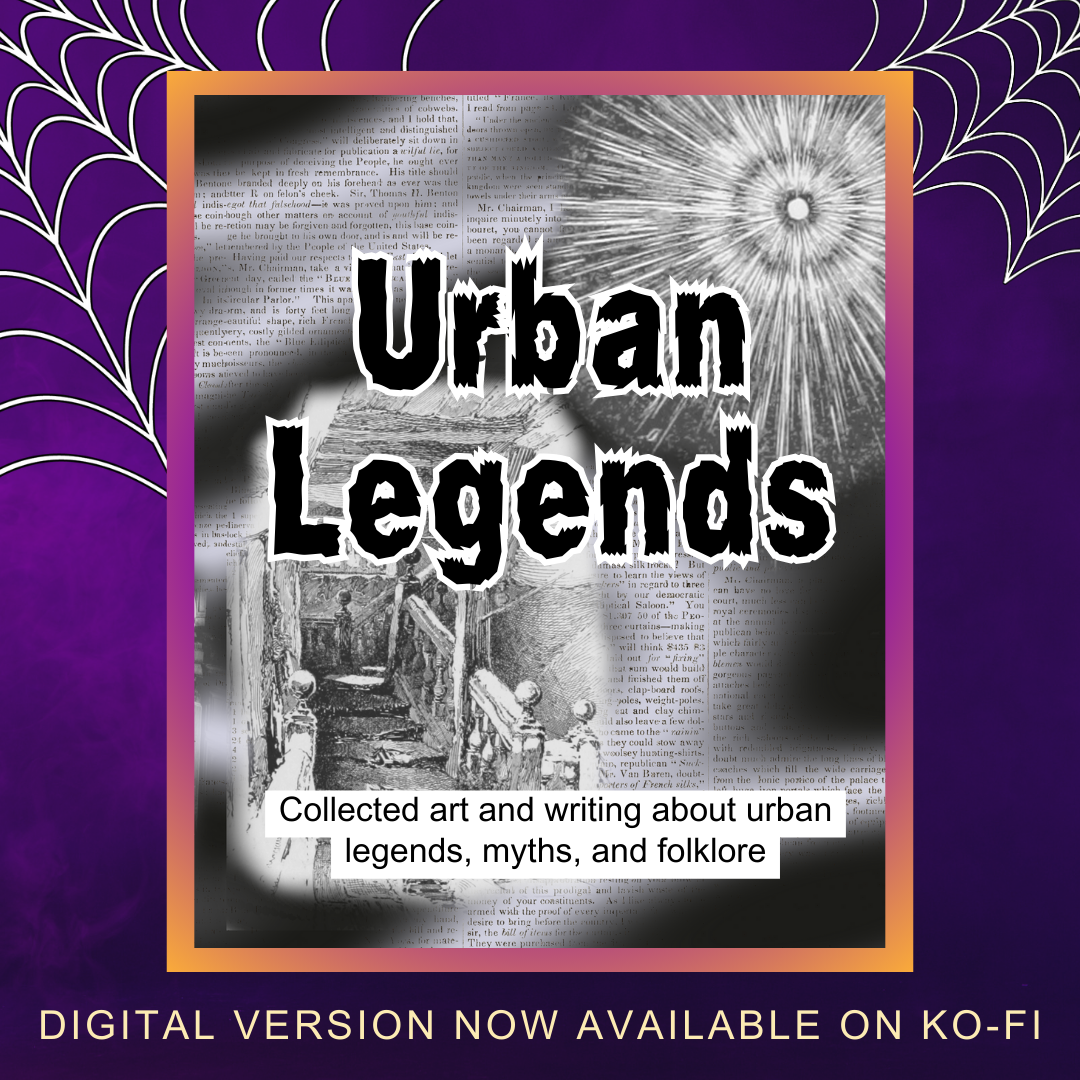
Urban Legends made it to Australia!
I sent a copy of Urban Legends to Sea Green Zines, since she helped get the word out about open submissions.
Check out the video review on Sea Green Zines’ YouTube channel. Urban Legends is about 25 minutes in.
There’s a whole other set of zines in the video before that if you want to check that out, too. 😃
Left-brained art
“Left-brained art” is a mini zine that includes tips for how to make art without having to plan all the details up front. Each page includes a tip and brief explanation.
This zine encourages you to work with the materials you already have and not worry about what people will think of the finished work.
I drew the background by hand with markers. Layout and text in Canva.
Copies are available in my Etsy shop (U.S. only). I’m also open to trading! (Message me.)
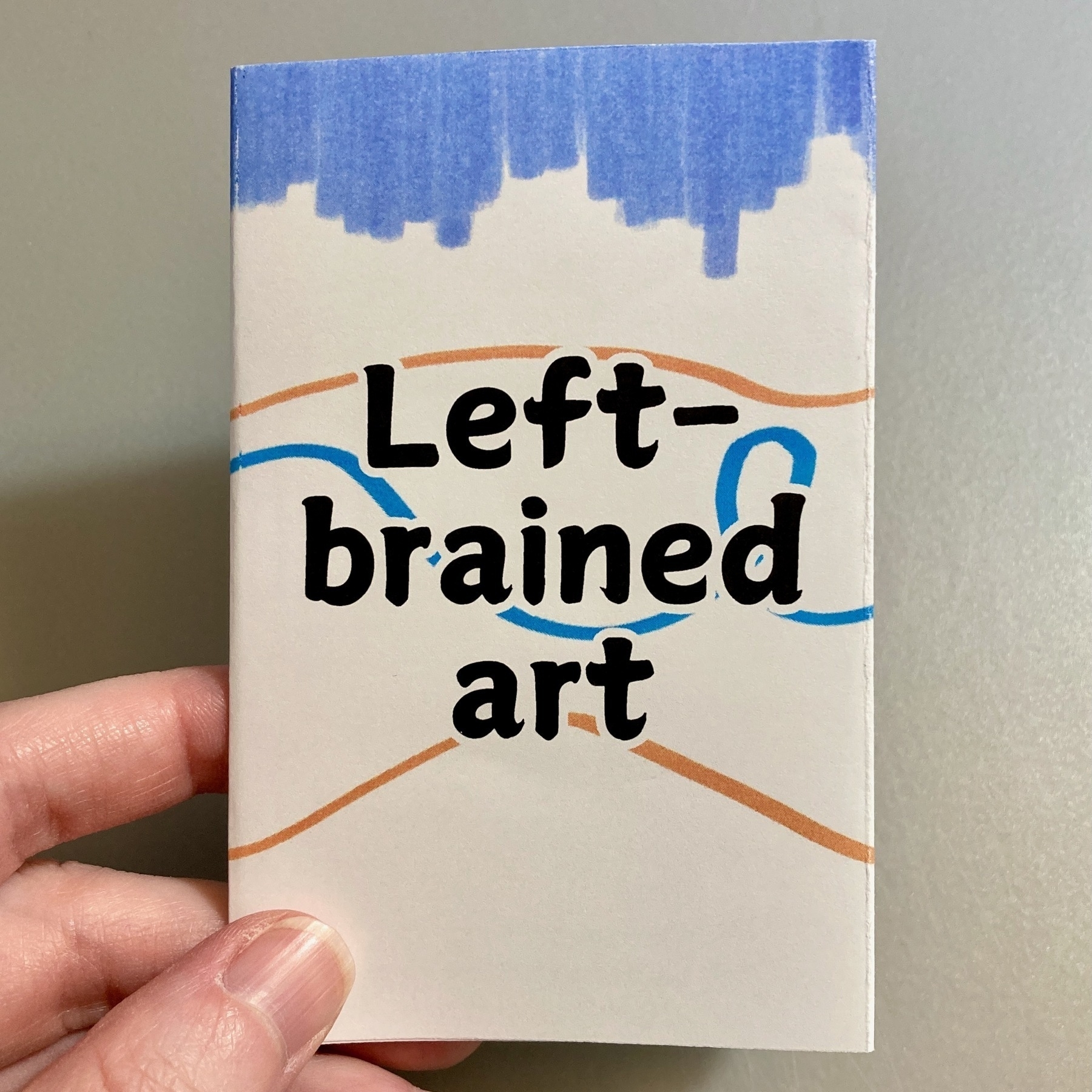
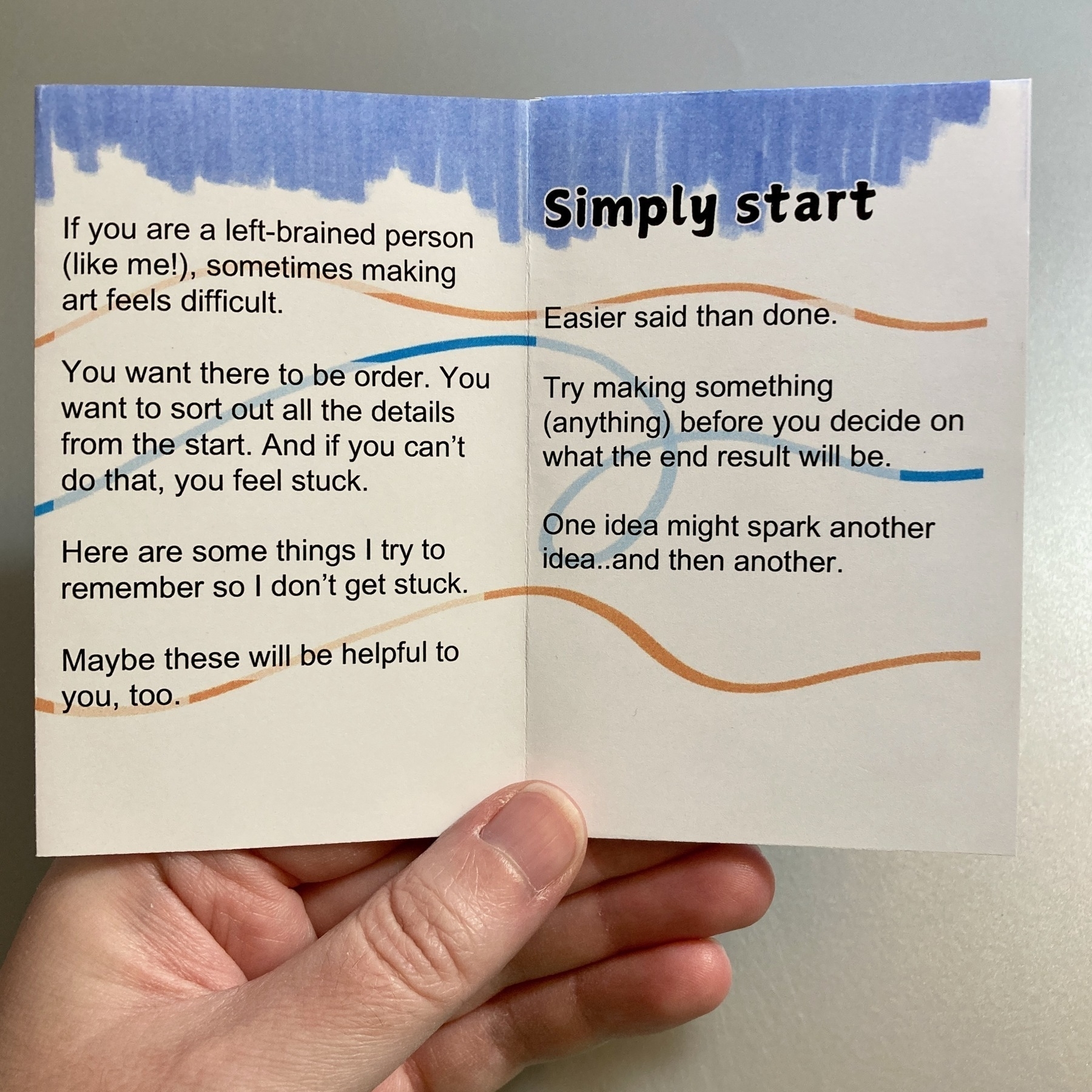
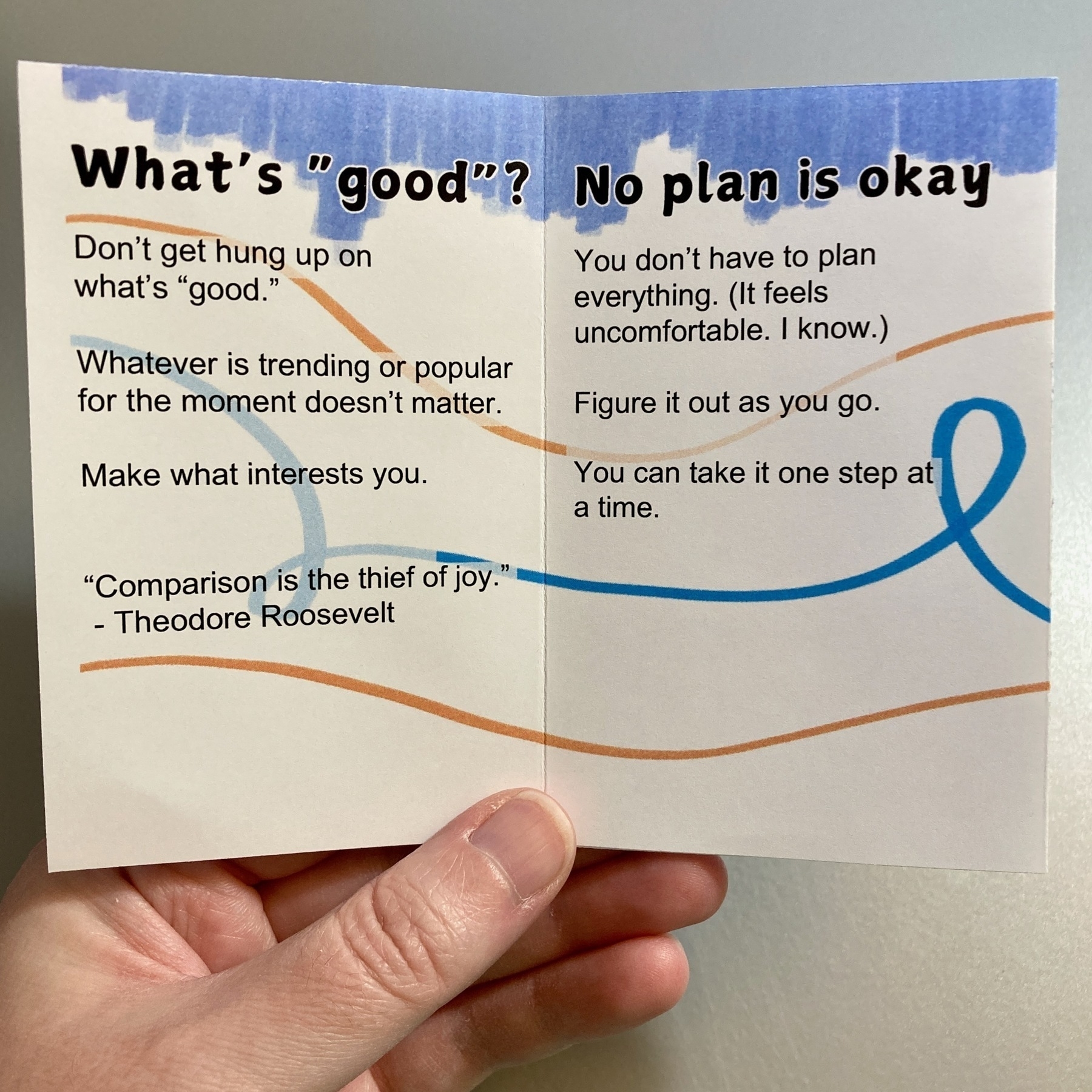
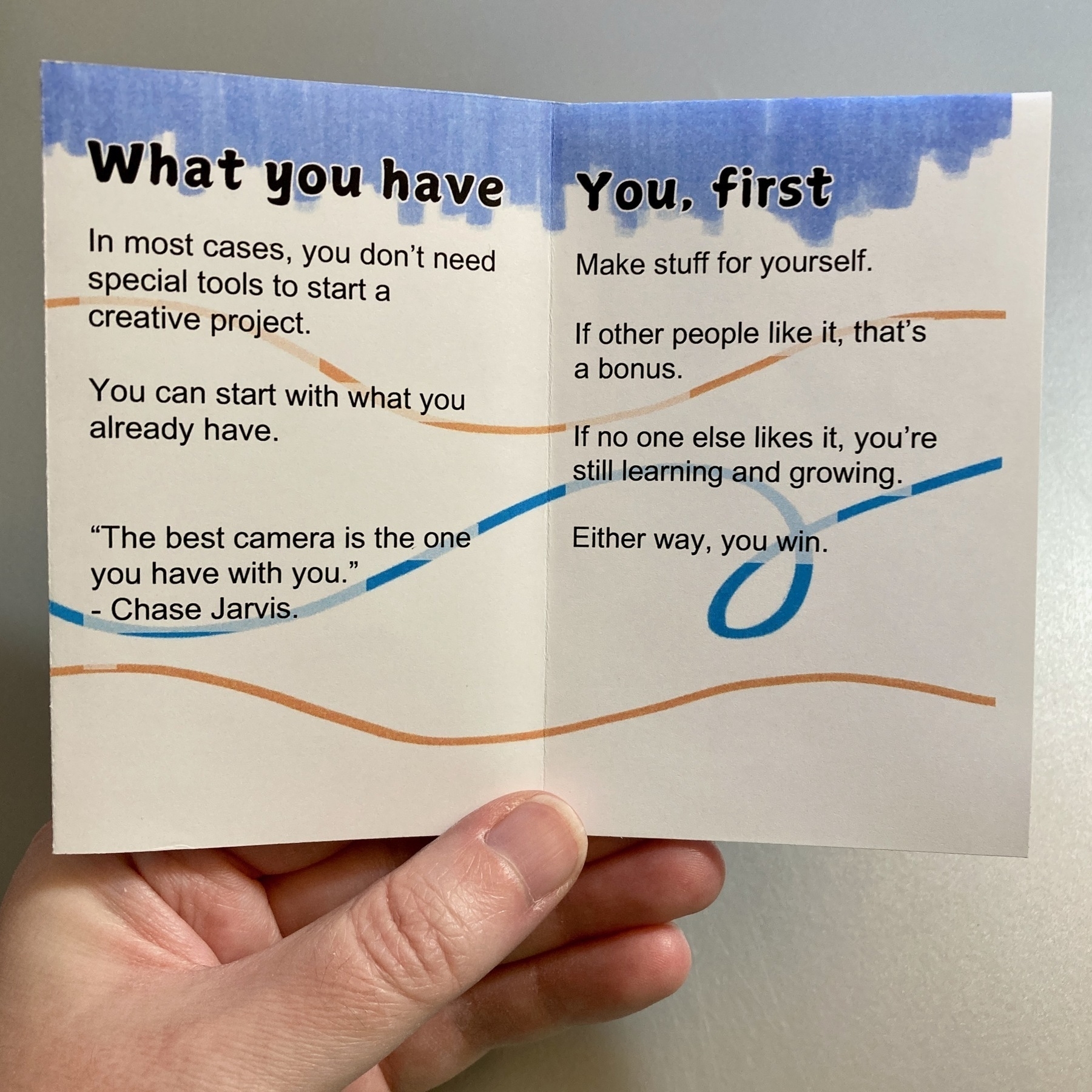
Full text in the zine:
Front cover
Left-brained art
Page 1
If you are a left-brained person (like me!), sometimes making art feels difficult.
You want there to be order. You want to sort out all the details from the start. And if you can’t do that, you feel stuck.
Here are some things I try to remember so I don’t get stuck.
Maybe these will be helpful to you, too.
Page 2
Simply start
Easier said than done.
Try making something (anything) before you decide on what the end result will be.
One idea might spark another idea..and then another.
Page 3
What’s “good”?
Don’t get hung up on what’s “good.”
Whatever is trending or popular for the moment doesn’t matter.
Make what interests you.
“Comparison is the thief of joy.” – Theodore Roosevelt
Page 4
No plan is okay
You don’t have to plan everything. (It feels uncomfortable. I know.)
Figure it out as you go.
You can take it one step at a time.
Page 5
What you have
In most cases, you don’t need special tools to start a creative project.
You can start with what you already have.
“The best camera is the one you have with you.” – Chase Jarvis
Page 6
You, first
Make stuff for yourself.
If other people like it, that’s a bonus.
If no one else likes it, you’re still learning and growing.
Either way, you win.
My first zine was a joke
“So you met your doppelgänger” was the first zine I made, back in December 2019. It was a fun little thing to give to my friends at work for New Year’s Day. I was playing with the idea of “new year, new you.”

I wanted the zine to read like a straightforward guide but at the same time, it’s dry humor.
The stick figure drawings add to the effect: The zine seems serious but it’s actually silly.
Then I posted the zine online, made a few more zines, and started an Etsy shop. “So you met your doppelgänger” was getting positive reactions from people. Copies were selling on Etsy.
In 2023, I went to my first zine fest. People stopped by my table and picked up “So you met your doppelgänger.” They laughed when they read it and said it was clever. It was the first time I saw strangers’ reactions to my zines, in person.
Five years after I made it, “So you met your doppelgänger” is still my most popular zine. There are over 300 copies of it out in the world.
And it started as a joke.
When I made “So you met your doppelgänger,” I had no idea people would find it online and purchase copies…and continue to do that for years.
So whatever you’re making, share it. You can’t predict how people will react to your work.
Share it, and see how it goes.
Test copies
This week I’ve been making minor edits to my new mini zine, Left-brained art.
After I drafted text and images, I printed a test copy. Then I used a red pen to mark edits and changes.
Back to Canva to make edits and then print a new test copy.
More red pen.
Repeat until I’m happy with how everything looks.
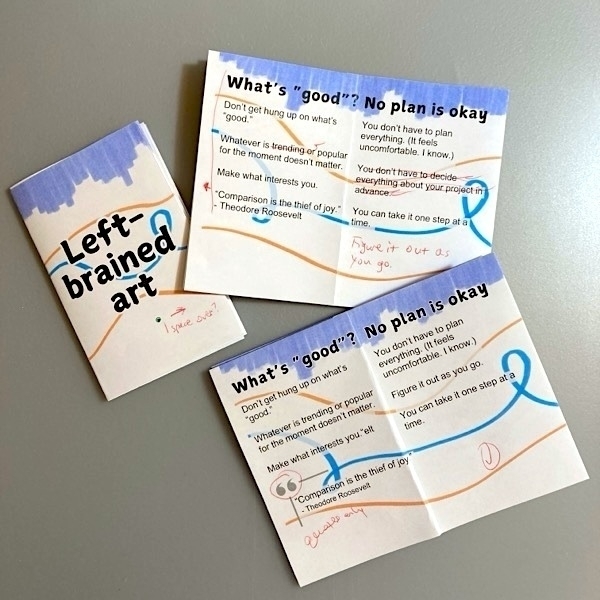
Contributor zine: Urban Legends
“Urban Legends” is a quarter-page zine that collects art and writing about urban legends, myths, and folklore. Eighteen people contributed stories, poetry, illustrations, and collages. Work was submitted from the U.S., Canada, Scotland, Belgium, and Germany

The finished zine is 36 pages (including covers); 4.25" wide x 5.5" high; printed in black & white; and bound with staples.
The cover is white cardstock. Interior pages are 24 lb white paper.
I’m mailing copies to contributors this week. Limited copies are available in my Etsy shop.
Urban Legends is also available as a digital zine. You can download it for free on Ko-fi (or pay what you want).
Check out a few of the pages:



Zine station success
Yesterday I ran a zine-making station at a public library fundraiser. 🙂
The library had a Fall Fair with a bake sale, raffles, magic show, and games. Arts and crafts tables were inside the library. Here’s the zine-making station.

The library provided magazines, scrapbook paper, markers, glue sticks, scissors, and plain white paper. I brought copies of How to make a mini zine and What’s a zine?
This is the first time I’ve done a zine event with kids. Having collage materials definitely helps, so kids don’t have to write something on the spot.
Two girls spent about an hour and a half at the table, making two zines each, because they said they were having so much fun. 🥹
I think if I do more kid-focused zine events, I might make some kind of template that they can fill in. Having more of a guide might be a nice option besides having a blank piece of paper.
Here’s a zine I made during some downtime.





What's a zine?
“What’s a zine?” is an 8-page mini zine that you can download and print on your own. It includes a brief introduction to zines: what zines are, some historical highlights, and common formats.

The zine is available on Ko-fi for free (or pay what you want).
The PDF is sized to print on one sheet of 8.5 x 11-inch paper (standard U.S. letter size).
This zine is licensed under Creative Commons (CC BY-NC-SA 4.0), which means you’re welcome to distribute and share copies for non-commercial use.
If you don’t know how to fold this kind of zine, search for “how to fold an 8-page zine” on YouTube to find tutorials.
Washi tape as collage pieces
I’m working on a new zine, and I want to share some process pics with you. 🙂 I’m making pages with black and white illustrations and then using washi tape to make collage elements.
Here’s how I’m doing it.
- Draw the picture in black ink.

- Lay a piece of tracing paper over the drawing. With a pencil, outline the area where washi tape will go. For this page, I wanted a curved shape around the planet.

- Use washi tape to cover the area outlined in pencil. I kept even lines of tape but you could overlap pieces or rip the tape into smaller pieces.

- Flip the tracing paper over. Use scissors to cut along the pencil line.

- Glue the washi tape piece onto the drawing.

Zine: So You Met Your Past Self
“So You Met Your Past Self” includes tips for what to do when you meet a past version of yourself. This fictional zine is a handy guide for the time traveler in your life (even when that’s you).
This zine is available on Etsy (U.S.) only.




I made the background for this zine by hand. I diluted blue fountain pen ink in water. Then I painted the ink on to watercolor paper.

After the paper dried, I drew an abstract design with a dark blue marker and white gel pen.

This kind of line drawing is a technique I learned from Katie Gebely.
First you draw dots on the page, at random. Then you connect the dots with straight lines. That’s what I did with the dark blue marker. Then I added shorter lines in white gel pen.
